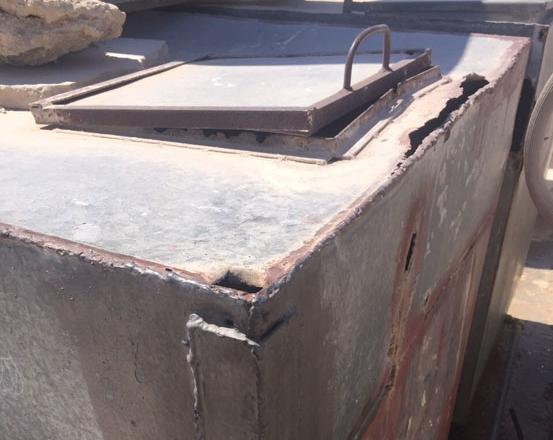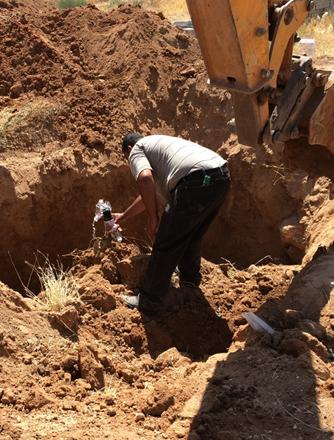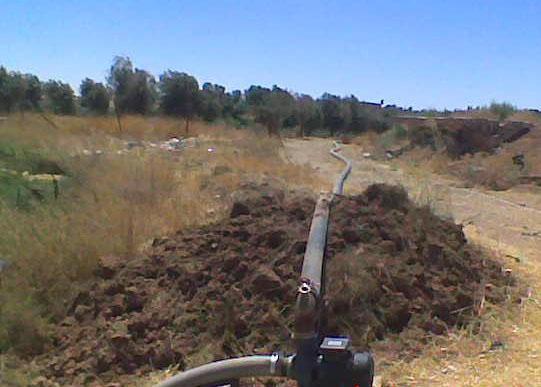You are here
Households use only 5% of water for drinking, 45% in bathrooms, gardens
By Hana Namrouqa - May 30,2015 - Last updated at May 30,2015

Consumers’ negligence in carrying out regular maintenance on their water tanks is a major source of household water loss, according to a study by the Water Authority of Jordan (Photo courtesy of the Ministry of Water and Irrigation)
AMMAN — Only 5 per cent of domestic water is used for drinking and cooking purposes, according to a new study, which said that 45 per cent of the water is used in bathrooms and for the irrigation of gardens.
The study, released on Saturday by the Water Authority of Jordan (WAJ), showed that showers account for 30 per cent of the supplied domestic water used in bathrooms, while 20 per cent is used for washing clothes and cleaning houses.
Consumers’ negligence in carrying out regular maintenance on their water tanks is a major source of household water loss, with 50.07 per cent of subscribers failing to implement any kind of maintenance on their water tanks, according to the study, which covered all parts of the country.
“In addition, 59.2 per cent of consumers who complain about high water bills have broken float valves,” the study said.
The report aimed at identifying water consumption patterns and sources of water loss in households, an official at the Ministry of Water and Irrigation told The Jordan Times on Saturday on condition of anonymity.
Failing to fix leaking pipes, tanks or broken float valves not only causes water loss but also damages the foundations and walls of buildings, the official said.
“A total of 21 per cent of households whose owners fail to carry out regular maintenance on their water tanks and pipes have leakage inside their houses and suffer from cracked and rotten walls,” the study said.
Moreover, 13 per cent of water-quality-related complaints handled by WAJ are caused by internal leakage of wastewater due to worn out pipes, failure to clean water tanks regularly or leaving them without a cover, according to the study.
“A broken float valve causes the loss of over 15 litres per minute or one cubic metre per hour, while a broken toilet flush leads to the loss of 12 litres per minute or three quarters of a cubic metre every hour,” the study indicated.
The ministry official said using hoses to clean pavements, gardens and cars is illegal, noting that water companies and WAJ send written warnings to consumers who waste water and suspend water services until they pay a fine and pledge to conserve water.
“Wasting water is more common in urban areas; therefore, WAJ and the water companies will intensify inspection campaigns on households,” the official said.
Repeat offenders are denied water services for three months, even if they pay the fine for wasting water, he noted.
Under the water distribution programme, households receive water once a week on a rotating basis.
Scarce water resources compelled the Kingdom to initiate the programme in the early 1980s to ensure a sustainable water supply to subscribers.
Jordan ranks as the world’s second water-poorest country, where water per capita is 88 per cent below the international water poverty line of 1,000 cubic metres annually.
The available water resources in Jordan offer 800-900 million cubic metres of water annually, according to the ministry, which said that this annual amount provides for the needs of only three million people, while the number of water users in Jordan now exceeds 10 million people.
Related Articles
AMMAN — The Ministry of Water and Irrigation on Sunday urged the public against using municipal water for cleaning gardens and pavements, wa
AMMAN — Authorities on Thursday discovered three illegal fixtures on water mains in south Amman which were diverting some 5,000 cubic metres
The authorities on Saturday dismantled eight illegal pipes that were diverting thousands of cubic metres from the water main that supplies Jerash Governorate, according to officials.
















